Bleak House Books
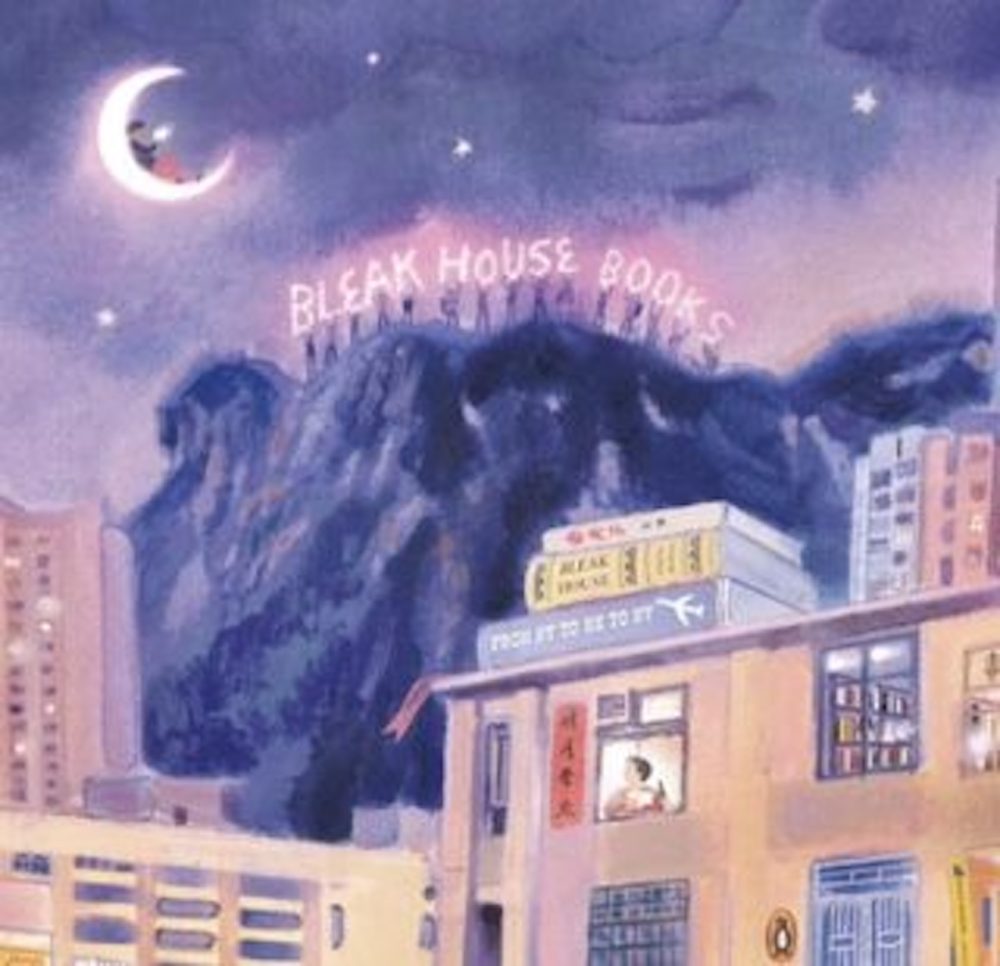
Moving countries is a painful process that can involve not only people and their families but entire businesses put at risk by political stances their owneres take. One of such businesses is »Bleak House Books« shop that had to leave Hong Kong and find a new home in New York.
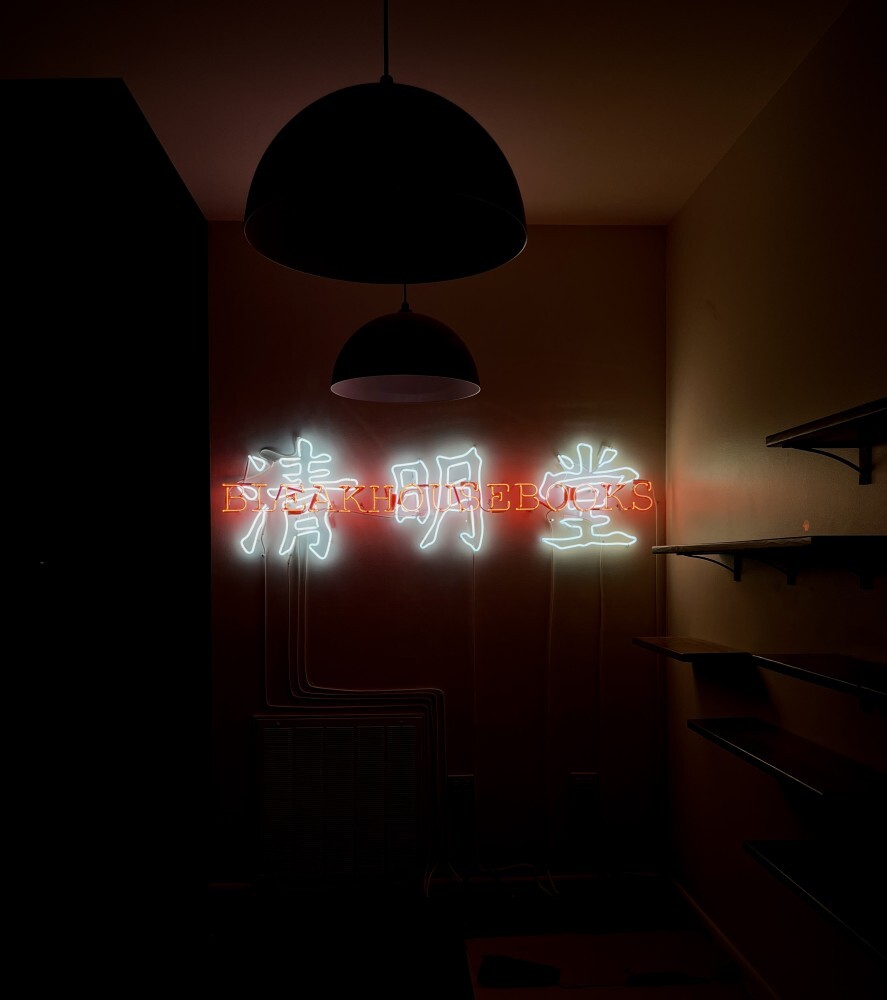
Bleak House Books is an independent, family-run bookstore, was established in Hong Kong in 2017, focusing on quality new and used English-language books. By October 2021, following the National Security Law that enabled severe government repression, the bookstore, like many others facing oppressive conditions, relocated from Hong Kong. A year later, its owners Albert Wan and his wife Jenny announced the bookstore’s reopening in Honeoye Falls, Western New York, where it continues to operate today.
Image in the profile: »Reading Below the Lion Rock« by Hong Kong artist, Don Mak
For a bookshop moving from Floor 27 in a buzzling business center of Hong Kong to the 7-hours’ drive from NY downtown, closer to corn fields and soy beans plantations is a decision that sounds less that reasonable. However, it was this that the owners of »Bleak House Books« were forced to do in 2021, after the introduction of the »draconian, made-in-China law« that provided the government with »near unlimited power to harass and jail anyone, anywhere for crimes like subversion, terrorism and collusion with foreign agents«. Witnessing arrests of important activists, lawyers and journalists and many Hongkongers emigrating, the bookshop owners Albert and Jenny emptied the shelves…
In the interview for platformB, Albert speaks about the political climate preceeding relocation, the hardships of community preservation at distance and the importance of finding your own anchor.
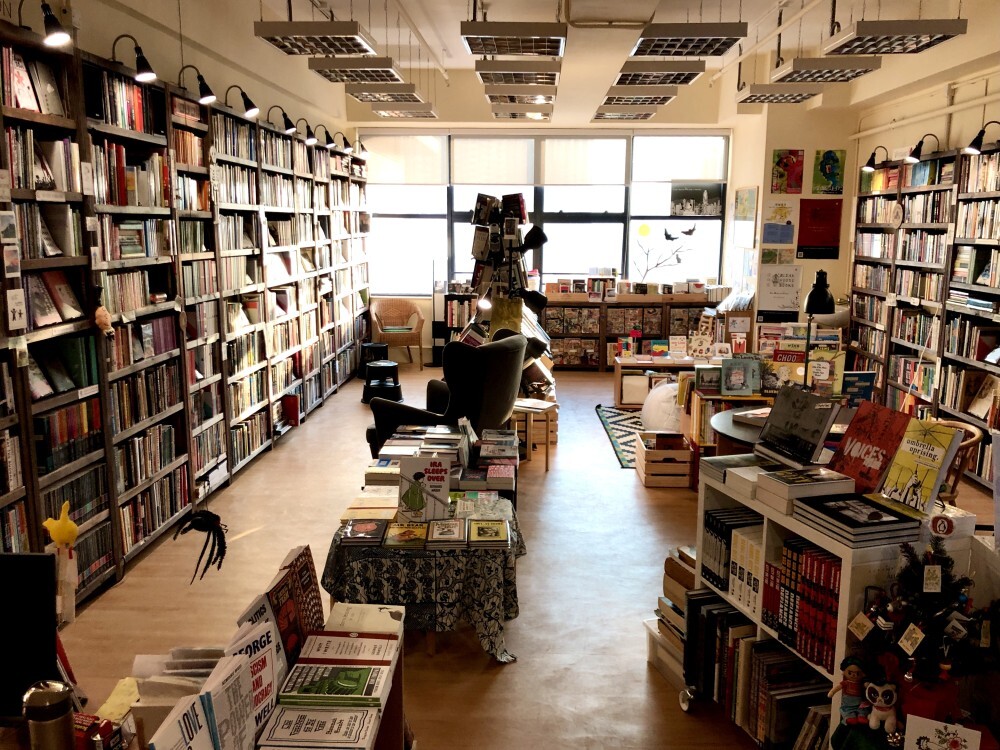
Bleak House Books in San Po Kong, Hong Kong (Jan. 5, 2021) Photo: Albert Wan
Hong Kong used to be known as the »paradise for banned books« that also boasted a rich reading culture. Could you please tell us a bit more about that? What role did private, little, often family-run bookshops play in HK life and how did they affected its development? Who were the readers of »Bleak House Books« readers?
To be honest, I have never heard Hong Kong described as »a paradise«! [Laughing] Maybe what is meant here is that there were books that were not sold in mainland China and one could buy them in HK, but that was not the reason why we opened »Bleak House Books«!
People rather used to refer to HK as a cultural desert. But I don’t think it is accurate, either. Yes, HK is driven by commerce, but this term was probably coined by people not engaged in the art and culture scene. When we moved to HK in 2017, that was something that often came up. »Oh, you know that HK is a cultural desert?« locals would ask. »Why do you want to have a bookshop there?«
In 2017, I remember the city as not having a very developed reading culture. Obviously, there were exceptions, but not many associated books with pleasure. The schooling system approached reading as necessary for passing tests only. So, it was always a challenge to cultivate a community where people saw books not just as textbooks or technical manuals but as something that could be fun and serve as a gateway to another world or another time. Looking back at our bookshop, I want to hope that we reached some folks who probably didn’t have that relationship with books and maybe they have it now because of us.
Photo on the left: Albert and Jenny with Rachel and Ella, the bookshops’ awesome first ever shop manager and her lovely dog, working a street market in Discovery Bay, Hong Kong (11 Nov. 2018) by Albert Wan
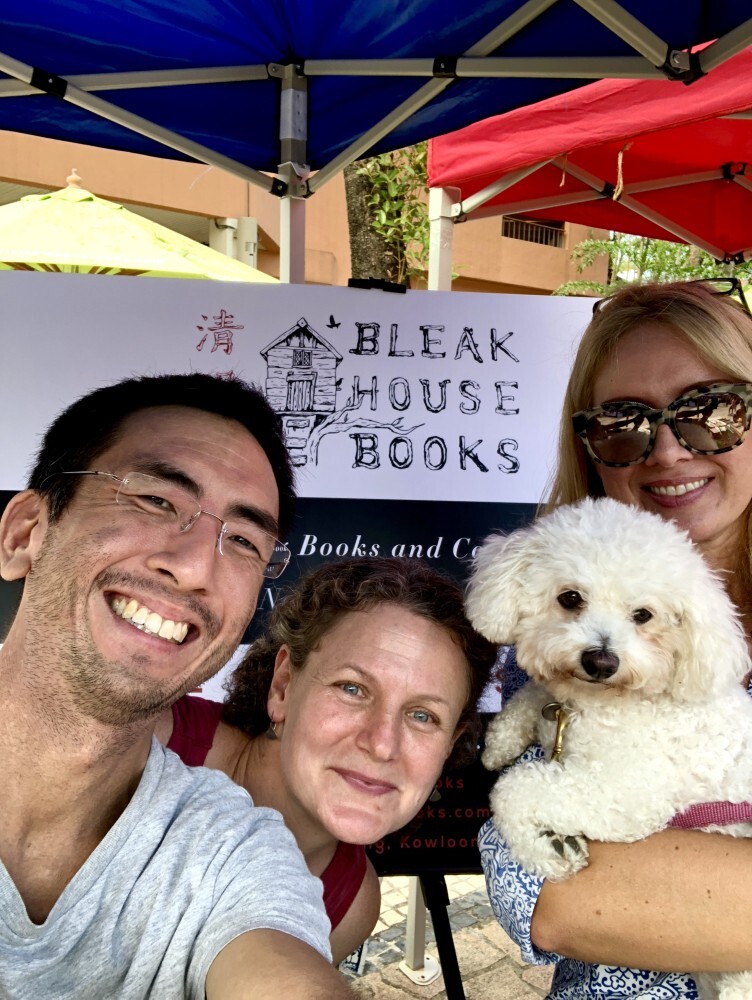
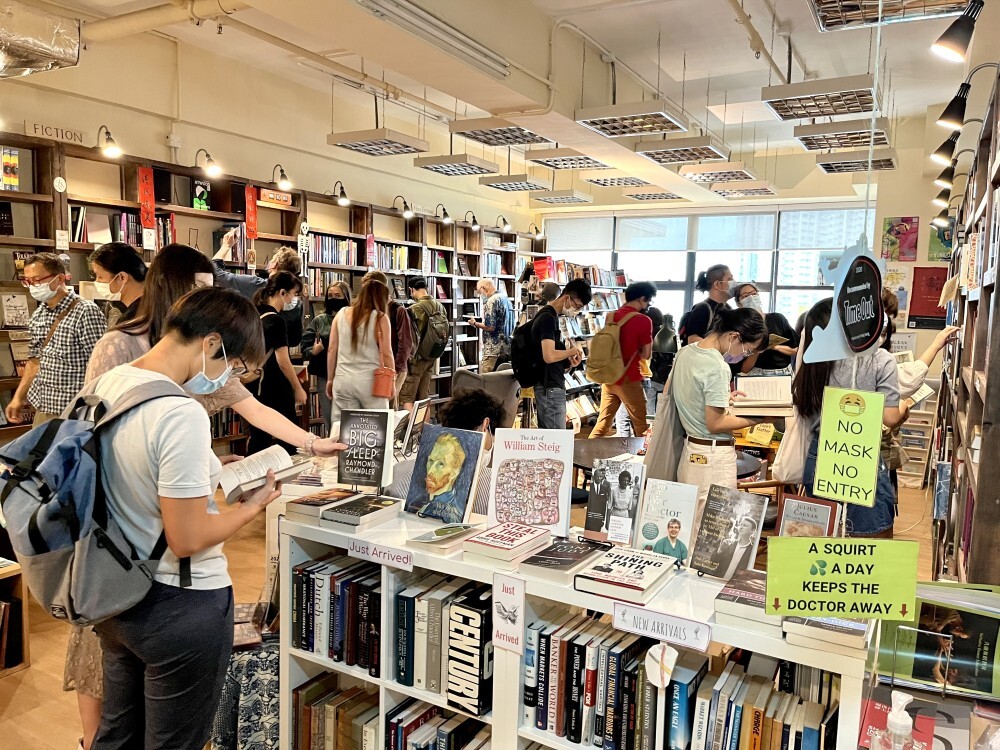
Bleak House Books in Hong Kong, 5 days until its last day (10 Oct. 2021). Photo: Albert Wan
Obviosuly, the first people who came to the shop were those who tended to go to small independent bookshops and read for fun–either locals or expats who were into reading and looked for sites like ours. But, as the word spread, ordinary Hongkongers from our neighborhood started getting curious about what we were doing. So, there was no one single segment of the community we catered for. Our readership was very broad and rather representartive of the diversity of HK population back in 2017.
Our family loved the bookshop in Hong Kong very much. It was bright, spacious (at least by Hong Kong standards), and nestled on the 27th floor of a high-rise office building overlooking Kowloon. It had cool, vintage-looking bookshelves stocked with books of all genres, ages and origins. More than that though, it had the best community of booklovers, friends and neighbors an indie bookseller could ever hope for.
The media often referred to our Hong Kong bookshop as a »literary oasis« or »literary outpost« but to the people who worked at and frequented the bookshop, it was more like one’s home away from home. A place that felt familiar, safe and warm.
During our time in Hong Kong we did what most indie bookshops do. We bought and sold lots of books, online and in-person. We hosted book talks and author signings. We supported and promoted local authors. We ventured outside the bookshop to sell our books and wares at street markets and schools. We rented out our bookshop for film shoots and musical performances. We even curated a 1,000-plus title private library and helped arrange for a surprise marriage proposal to take place at the bookshop.
A marriage proposal??
Daniel, a close friend of the bookshop, wanted to surprise his fiancée, Kaia, with a marriage proposal and an engagement ring. He cleverly concealed the ring inside a vintage Modern Library edition of Jane Austen’s novels, specifically within Chapter 52 of »Pride and Prejudice,« the first book he had ever given her. We eagerly assisted with Daniel’s charmingly sneaky plan by discreetly placing the book in an inconspicuous spot while Kaia was momentarily engrossed in browsing our collection.
Both Kaia and Daniel share a deep love for books, so it made perfect sense for them to get engaged in a bookshop! We were absolutely thrilled that they chose »Bleak House Books« as the backdrop for such a special moment.




Now let’s get closer to our days and to the situation that caused your relocation. Why did you leave Hong Kong?
Not soon after we opened our bookshop, Hong Kong was plunged into a period of unprecedented turmoil and civil strife. The government tried to enact a law that would give it the ability to extradite Hongkongers to mainland China for certain criminal offenses. The vast majority of Hongkongers opposed this law as did many professional and political groups in Hong Kong. For a long time, however, the government ignored their calls to shelve the law.
As you can imagine this led to large-scale protests, the kind Hong Kong, with its own very vibrant public protest culture, had never before seen in its history. One notable protest march was attended by an estimated two million people or one-third of the entire population of Hong Kong. As protests grew in number and intensity and violence, so too did the number of demands made by Hongkongers vis-a-vis the government.
Then came COVID and the draconian, made-in-China National Security Law that gave the government near unlimited power to harass and jail anyone, anywhere for crimes like subversion, terrorism and collusion with foreign agents. Almost overnight, Hong Kong was transformed into another mainland Chinese city. Public gatherings and elections were banned. Dozens of opposition figures, lawyers and journalists were arrested. ‘Sensitive’ books were pulled from library shelves, and movies censored. An unprecedented chilling effect seeped into every aspect of life for those living and working in the place that was once known as »Asia’s World City«.
Photo on the left: The million person protest march in Causeway Bay, Hong Kong (Aug. 18, 2019) by Albert Wan
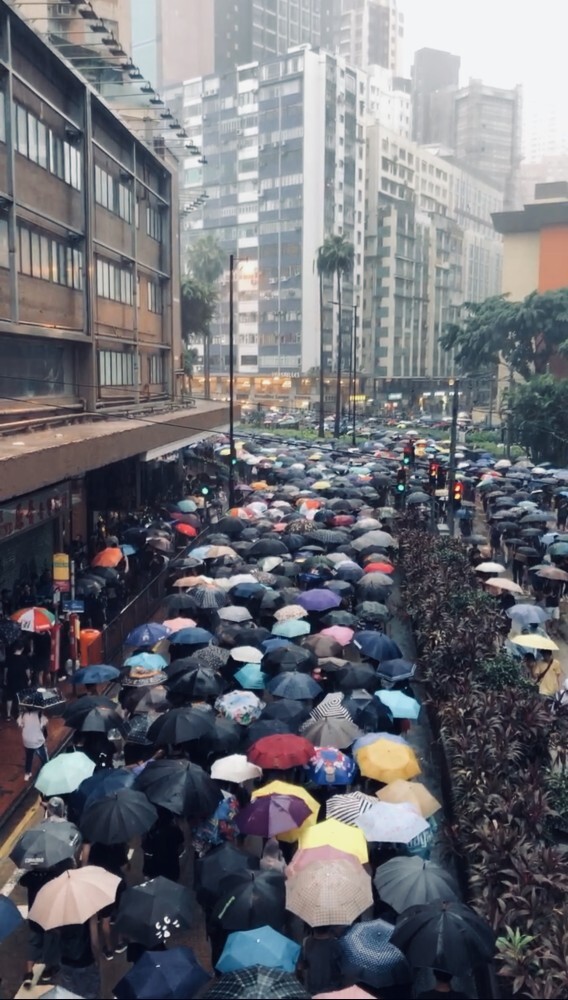
Сan you know recall any episode when you felt »Bleak House Books« belonged to HK and Hongkongers–that you had reached something important and meaningful?
It didn’t happen all at once. Reflecting back, I feel we had to struggle to reach a point where we could say we belonged there or were part of the community.
Obviously, 2019 was a particularly memorable time. Alongside 70–80% of Hongkongers who opposed the actions of the Mainland Chinese government, we took a stand in the protests and were vocal about our position. It felt like a strong sense of brotherhood or rather friendship, a sense of community. We were proud to share these emotions with others, regardless of whether they knew anything about our shop or had any opinion about it—it was this solidarity and encouragement that resonated. We did it because we felt Hong Kong was our home and our community, and we had to support everyone who was taking a stand against injustice.
So, the adoption of the National Security Law and the increasing pressure on civil society caused waves of HK migrants to start looking for refuge: someone move to Taiwan, others–to English-speaking countries, like the UK, the US and Australia. You returned to the US. How are you now following the HK agenda? To which extent and how is HK diaspora staying connected overseas?
Hong Kong is an important part of our bookshop, and it always remain such. It’s crucial for us to stay informed about the events in HK and reflect on the changes occurring there, particularly in relation to bookshops, to understand how the population is responding (or not) to the increasingly hostile political climate. In our shop, we have a dedicated section for HK literature, which we intend to maintain as long as the shop operates. We are also eager to host talks by authors who have written about Hong Kong. However, I wouldn’t say that this is our main focus.
Our primary focus is ensuring the survival of our business and fostering a strong sense of community here. These are our two main goals every day we open our bookshop towards. While our community includes people in Hong Kong who still follow and support us, our influence there is limited due to the geographical distance–still there are thousands miles between us… We need to concentrate on actions that can have a real or more direct impact.
I believe it’s more challenging for Hongkongers to establish a diaspora similar to that of Belarusians. In Hong Kong, English is an official language alongside Chinese and, when in exile, most Hongkongers use English due to the countries they move to, like Canada and the UK. The political climate there is more stable and less dysfunctional, so such environment does allow to open bookstores or start publishing companies to preserve our culture and Cantonese language without fear of persecution. However, the transition is still difficult due to cultural and linguistic differences, and the need to find employment. Many would prefer to continue the work they were doing back in Hong Kong or engage in more politically active pursuits, but being in exile doesn’t automatically mean doing it at once. The primary challenge is daily survival. People cannot be expected to »keep up the good fight« if they cannot even put food on the table.
While some individuals might have a better situation with family connections in places like Great Britain or previous experience living there, those without such support face immense difficulties in establishing themselves. This makes it harder for them to continue their political and cultural efforts related to Hong Kong. My perspective is based on limited interactions with others, but our experience here shows that it took time to adapt, to find community, and settle despite already being familiar with the US culture and language. But when we arrived to America, we realized that what we needed for »Bleak House Books« was an anchor, some continuity, preservation of the bookshop’s history in Hong Kong, because this is also a part of Hong Kong’s history.
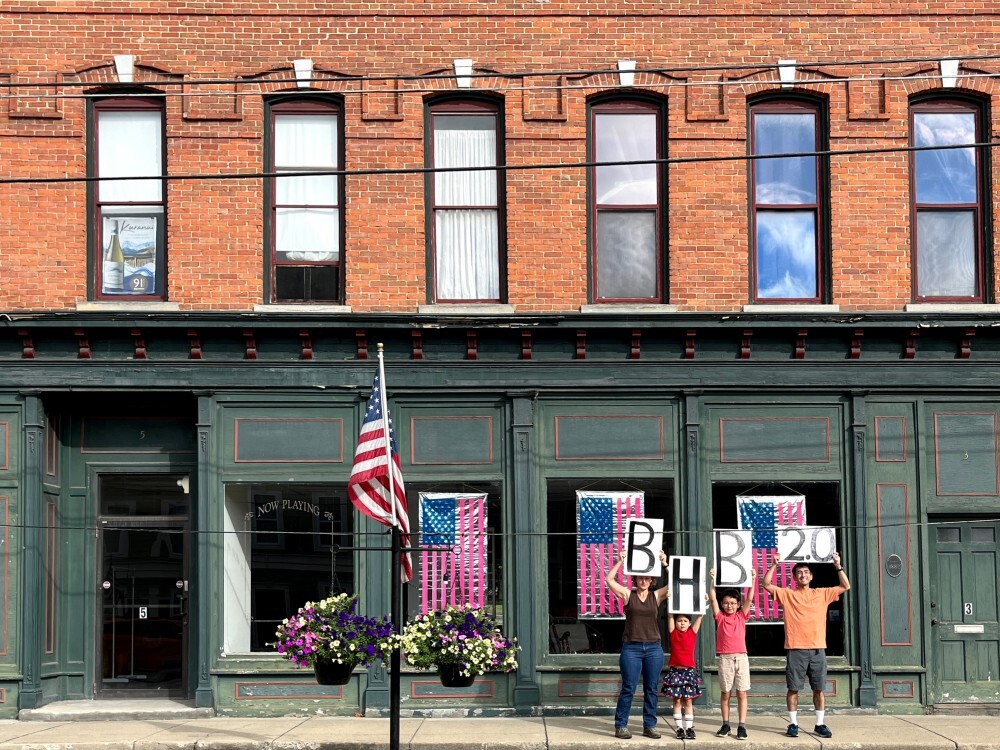
Interview, layout and landscapes photos of Hong Kong–Olga Bubich
A few paragraphs from the interview regarding the history of the bookshop were taken, with Albert’s permission, from his text presented on https://www.bleakhousebooks.com/our-story.php